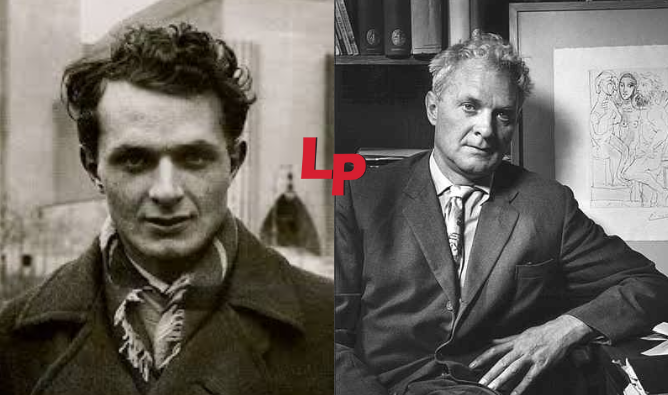Stephen Spender Biography – Jon Langston speller was an English poet, novelist, and essayist who wrote poems touching on issues of social issues of class struggle. Spender is well known as a major literary figure of the 20th century ; he made a great contribution to modern poetry, and in 1965 was appointed Consultant in Poetry at the Library of the United States. His life was fully associated with the literary and political processes of the period, so he became the main figure in the intellectual and creative processes of this period.
In an interview conducted by LifePages Media with Stephen Spender we were able to gather information regarding this personality which we will unveil in this article such as his net worth, age and achievements.
Stephen Spender Biography
| Category | Details |
|---|---|
| Full Name | Sir Stephen Harold Spender |
| Date of Birth | February 28, 1909 |
| Place of Birth | Kensington, London, England |
| Date of Death | July 16, 1995 |
| Age at Death | 86 years |
| Nationality | British |
| Parents | Harold Spender (Father), Violet Hilda Schuster (Mother) |
| First Wife | Inez Pearn |
| Second Wife | Natasha Spender |
| Cause of Death | Heart attack |
| Occupation | Poet, Novelist, Essayist |
| Famous Works | Poems, The Temple, The Truly Great |
Early Life and Education
Stephen Spender was born on February 28, 1909, in Kensington, London. His father, Harold Spender, was a journalist, and his mother, Violet Hilda Schuster, was a painter and poet of German-Jewish descent. Spender was initially educated at Hall School in Hampstead and then attended Gresham’s School and Charlecote School, though he was unhappy there. After his mother’s death, he transferred to University College School in Hampstead, which he described as a much gentler environment.
Spender later attended University College, Oxford, where he was introduced to some of the most influential writers of his time, including W.H. Auden and Christopher Isherwood. Although he left Oxford without a degree, his friendships with these figures helped shape his future career as a poet and writer.
Literary Career and Influence
Stephen Spender’s early poetry often centered on themes of social protest, addressing the disparities between classes and the political struggles of the 1930s. His early works, including Poems (1933), reflected his convictions about social justice and were influenced by his experiences in Europe during the rise of fascism.
Spender’s semi-autobiographical novel The Temple, written in 1929 and published in 1988, explores his experiences in Germany during the late Weimar Republic, highlighting the cultural openness he admired alongside the ominous rise of Nazism. His works also touched on his personal relationships and political ideals, which were influenced by his associations with fellow writers like Louis MacNeice and Cecil Day-Lewis.
Throughout his career, Spender was involved with prominent literary circles, including the Bloomsbury Group, and maintained friendships with writers like T.S. Eliot, Virginia Woolf, and Ernest Hemingway. His political views led him to join the Communist Party for a brief period in the 1930s, though he later distanced himself from communism and became disillusioned with its ideals.
Personal Life
Stephen Spender was married twice. His first marriage, in 1936, was to Inez Pearn, whom he divorced in 1939. In 1941, he married Natasha Spender, a concert pianist of Jewish descent, with whom he shared a long and successful marriage.
Spender’s personal life was also shaped by his close relationships with several men, particularly Tony Hyndman, a Welsh Guardsman and occasional prostitute. His relationship with Hyndman contributed to his departure from the Communist Party in the late 1930s.
Later Years and Legacy
In the post-World War II period, Spender’s career expanded beyond poetry to include editing and teaching. He co-founded Horizon magazine, an influential literary publication, and edited Encounter magazine until 1966. His work as an editor and writer contributed to the intellectual debates of the time, especially those surrounding freedom of expression.
In 1965, he was appointed U.S. Poet Laureate Consultant in Poetry to the Library of Congress, further cementing his status as an international literary figure. He taught at several prestigious institutions, including University College London, where he served as a professor of English, and American universities such as Berkeley and Northwestern.
Spender was knighted in 1983 for his contributions to literature and intellectual life, and he continued to write and teach until his later years.
Death and Cause
Stephen Spender passed away on July 16, 1995, at the age of 86, due to a heart attack. His legacy as a poet, essayist, and political thinker remains influential, and his works continue to be studied for their contributions to modernist literature and social commentary.
Conclusion
Stephen Spender’s life was deeply intertwined with the literary, social, and political movements of the 20th century. His poetry and prose reflect his passionate engagement with social justice, class struggles, and the human condition, making him a central figure in modern literature. His enduring works, from Poems to The Temple, offer insight into both his personal experiences and the broader historical context in which he lived and wrote
